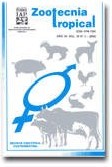
|
Zootecnia Tropical
Instituto Nacional de Investigaciones Agrícolas Venezuela
ISSN: 0798-7269
Vol. 21, No. 1, 2003, pp. 27-41
|
 Bioline Code: zt03003
Bioline Code: zt03003
Full paper language: Spanish
Document type: Research Article
Document available free of charge
|
|
|
Zootecnia Tropical, Vol. 21, No. 1, 2003, pp. 27-41
| en |
Masculinization of the rainbow trout, Oncorhynchus mykiss  , to obtain descendant all-females in a Venezuelan fish hatchery , to obtain descendant all-females in a Venezuelan fish hatchery
Hilda R. Bastardo y Sara B. Sofía B.
Abstract
The sex reversion technique is widespread in many countries of North America and Europe to get all-female trouts. The development of these techniques is desirable because trout males reach their gonad maturity at the first year of age, while the female do it after two years of age. The objective of this research was to masculinizate trouts to get genotypic females with capacity to produce semen and behave as a functional male. The sex reversion is produced by feeding the animals for 932 °C/days with food containing 3 mg/kg of 17 a-methyl testosterone. We found 57% sex reversal female, 27% with atrophic gonad, and 16% were not affected by the treatment. The offspring of the crossing between normal female and sex reversal female were 100% females, while the control group displayed a sex ratio of 1:1. The products of this research are of mayor importance for the trout farmer in Venezuela because this technology would allow reducing the fattening cycle, increasing the profit.
Keywords
All female trout, mixed-sex trout, sex reversal, masculinization, methyl testosterone
|
| |
| es |
Masculinización de la trucha arco iris, Oncorhynchus mykiss  , para obtener descendencia todas hembras en un criadero venezolano , para obtener descendencia todas hembras en un criadero venezolano
Hilda R. Bastardo y Sara B. Sofía B.
Resumen
La obtención de truchas todas hembras, a través de la masculinización de las hembras es ampliamente utilizada en muchos países de Norteamérica y Europa. El desarrollo de técnicas de control sexual es económicamente deseable en los salmónidos, debido a que los machos alcanzan la madurez gonadal al año de edad, mientras que las hembras lo hacen después de los dos años. El objetivo del presente trabajo fue masculinizar las truchas para obtener ejemplares genotípicamente hembras, capaces de producir semen y comportarse como machos funcionales. Para la masculinización se utilizó 3 mg de 17α-metil testosterona por cada kg de alimento, suministrado durante 75 días. Después de este período de alimentación continuaron con su dieta normal hasta el final del experimento. Los resultados encontrados indican que el 57% de las hembras del grupo experimental se masculinizaron, 27% presentaron gónadas atrofiadas y 16% no fueron afectadas por el tratamiento. La progenie procedente del cruce entre hembras normales y hembras masculinizadas presentó una relación de sexo donde el 100% de la progenie fue hembra, mientras que el grupo control presentó una relación 1:1. Los productos logrados a través de esta investigación son de gran importancia para los productores de trucha de Venezuela, ya que la incorporación de esta tecnología en este sistema productivo permitirá acortar el ciclo de engorde, incrementando los rendimientos en la explotación de este salmónido.
Palabras-clave
Truchas, todas hembras, ambos sexos, reversión de sexo, masculinización, metil testosterona
|
| |
© Copyright 2001 - Zootecnia Tropical. Free full-text also available online at http://www.ceniap.gov.ve/bdigital/ztzoo/zooindex.htm
Alternative site location: http://www.sian.inia.gob.ve/repositorio/revistas_ci/ZootecniaTropical/ztindice.htm
|
|
